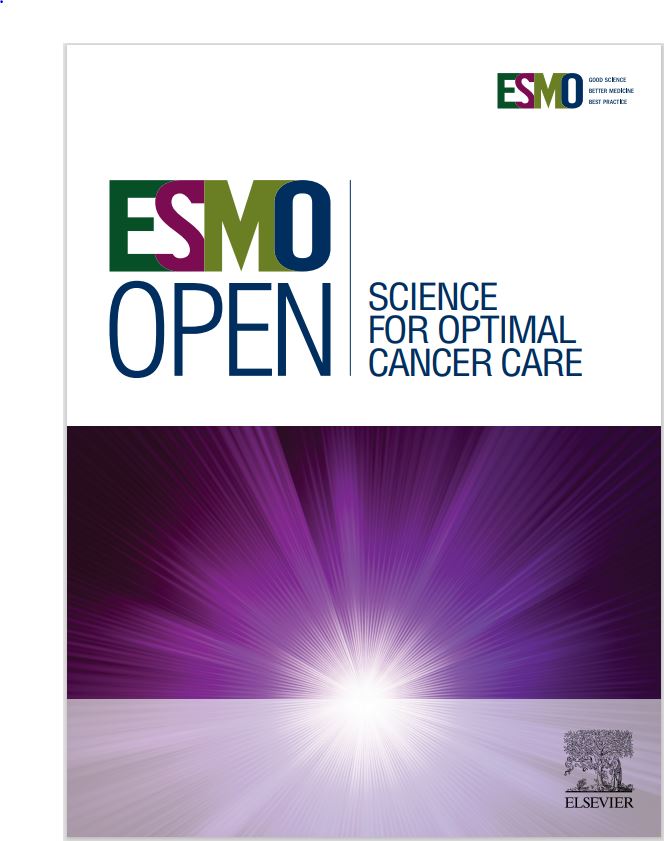A simple prognostic score to predict recurrence after pancreaticoduodenectomy for ampullary carcinoma: results from the French prospective FFCD-AC cohort
IF 7.1
2区 医学
Q1 ONCOLOGY
引用次数: 0
Abstract
Background
Ampullary carcinoma (AC) is a rare and severe gastrointestinal cancer with a disease recurrence rate of around 40% after curative-intent surgery and for which the main prognostic factors and adjuvant treatment decision remain a matter of debate.
Patients and methods
The FFCD-AC cohort is a French nationwide prospective cohort, which included patients with non-metastatic resected AC. The primary objective of this study was to describe prognostic factors associated with disease-free survival (DFS) and overall survival (OS) after pancreaticoduodenectomy (PD) so as to propose a user-friendly score to better estimate the risk of recurrence. The secondary objective was to study the benefit of adjuvant therapy in terms of DFS and OS.
Results
Three hundred and seventy patients with resected AC were included. Median follow-up was 40.6 months. Median age was 68.5 years (32.0-87.0 years), 53.8% of patients were male and 56.1%/37.4%/6.5% had an Eastern Cooperative Oncology Group performance status 0/1/2, respectively. Pathological subtype was intestinal/pancreatobiliary/mixed-undetermined in 29.5%/40.5%/30.0% of patients, respectively. Adjuvant chemotherapy was carried out in 61% of patients. In multivariable analysis, stage III tumor [hazard ratio (HR) 2.86, (95% confidence interval {95% CI}: 1.89-4.17), P < 0.0001], high tumor grade [HR 2.51, (95% CI: 1.42-4.43), P = 0.002] and non-intestinal subtype [HR 1.58, (95% CI: 1.00-2.49), P = 0.052] were associated with shorter DFS. A score based on these three parameters divided patients into low (n = 83), intermediate (n = 133) and high risk (n = 96) with median DFS not reached (NR)/73.1/15.2 months and a median OS NR/86.1/38.2 months, respectively. After propensity score matching, adjuvant chemotherapy was associated with longer DFS [HR 0.57, (95% CI: 0.45-0.72), P < 0.0001] in the cohort.
Conclusion
Our integrated score based on three easy-to-collect items—lymph node invasion, tumor grade and non-intestinal subtypes—seems highly prognostic in resected AC and needs to be confirmed in an external validation dataset to help adjuvant treatment decision making.
预测胰十二指肠切除术后复发的简单预后评分:来自法国前瞻性 FFCD-AC 队列的结果。
背景:杏仁核癌(AC)是一种罕见的严重胃肠道癌症,治愈性手术后的复发率约为40%,其主要预后因素和辅助治疗决策仍存在争议:FFCD-AC队列是法国的一个全国性前瞻性队列,包括非转移性切除AC患者。这项研究的主要目的是描述与胰十二指肠切除术(PD)后无病生存期(DFS)和总生存期(OS)相关的预后因素,从而提出一种便于使用的评分方法,以更好地估计复发风险。次要目的是研究辅助治疗对 DFS 和 OS 的益处:结果:共纳入 370 名切除前列腺癌的患者。中位随访时间为 40.6 个月。中位年龄为68.5岁(32.0-87.0岁),53.8%的患者为男性,56.1%/37.4%/6.5%的患者的东方合作肿瘤学组表现状态分别为0/1/2。29.5%/40.5%/30.0%的患者病理亚型分别为肠道/胰胆管/混合-未确定。61%的患者接受了辅助化疗。在多变量分析中,Ⅲ期肿瘤[危险比(HR)2.86,(95% 置信区间{95% CI}:1.89-4.17),P 结论:Ⅲ期肿瘤的危险比(HR)为2.86:我们的综合评分基于三个易于收集的项目--淋巴结侵犯、肿瘤分级和非肠道亚型--在切除的 AC 中似乎具有高度预后性,需要在外部验证数据集中得到证实,以帮助辅助治疗决策。
本文章由计算机程序翻译,如有差异,请以英文原文为准。
求助全文
约1分钟内获得全文
求助全文
来源期刊

ESMO Open
Medicine-Oncology
CiteScore
11.70
自引率
2.70%
发文量
255
审稿时长
10 weeks
期刊介绍:
ESMO Open is the online-only, open access journal of the European Society for Medical Oncology (ESMO). It is a peer-reviewed publication dedicated to sharing high-quality medical research and educational materials from various fields of oncology. The journal specifically focuses on showcasing innovative clinical and translational cancer research.
ESMO Open aims to publish a wide range of research articles covering all aspects of oncology, including experimental studies, translational research, diagnostic advancements, and therapeutic approaches. The content of the journal includes original research articles, insightful reviews, thought-provoking editorials, and correspondence. Moreover, the journal warmly welcomes the submission of phase I trials and meta-analyses. It also showcases reviews from significant ESMO conferences and meetings, as well as publishes important position statements on behalf of ESMO.
Overall, ESMO Open offers a platform for scientists, clinicians, and researchers in the field of oncology to share their valuable insights and contribute to advancing the understanding and treatment of cancer. The journal serves as a source of up-to-date information and fosters collaboration within the oncology community.
 求助内容:
求助内容: 应助结果提醒方式:
应助结果提醒方式:


